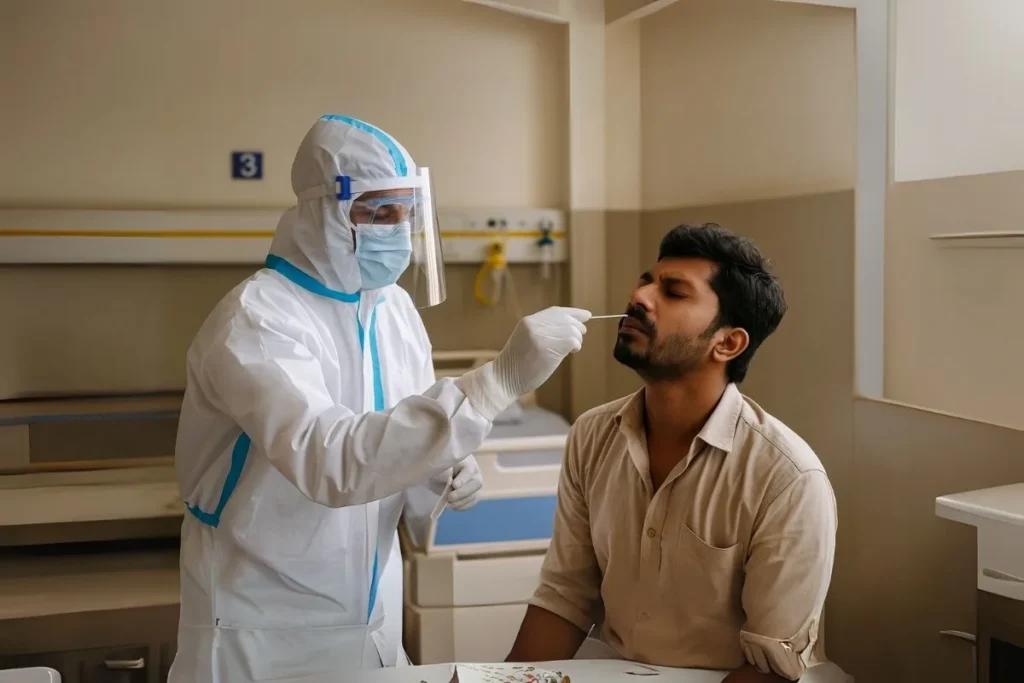If you watched the Malayalam film Virus during the lockdown, you probably remember how intense and haunting it felt. The movie was based on the 2018 Nipah outbreak in Kerala and sadly, this isn’t just cinema. Nipah virus encephalitis is back again. As of July 14th 2025, the virus has claimed two lives in Kerala.
This isn’t the first time Kerala is facing Nipah. There’s a pattern now. So, the question is why does this virus keep coming back here?
What exactly is the Nipah virus?
Nipah virus (NiV) is a zoonotic virus which means it spreads from animals to humans. It was first identified in Malaysia in 1998, but in the last decade, India, especially Kerala, has seen several outbreaks.
Its natural reservoir is fruit bats commonly called flying foxes. These bats don’t usually get sick, but they shed the virus through saliva, urine, or faeces. The infection can pass to pigs, and from there to humans. What’s more worrying is that it can also spread from person to person through droplets, close contact, or contaminated surfaces.
Why Kerala?
● Dense vegetation and fruit trees exist in residential areas that attract fruit bats. Human settlements are often close to bat habitats, hence making accidental exposure to the bats more easy.
● Raw date palm sap is a local delicacy consumed widely.. But when bats lick or urinate on collection pots, the sap can become a carrier.
● Human encroachment into forests is another major issue. As we build further into natural habitats, we’re narrowing the buffer between wild animals and ourselves.
● And then there’s the climate which is warm and humid, which helps the virus thrive in bat populations.
What happens when someone gets infected?
Symptoms usually start off with fever, body aches, sore throat. But within days, it can progress to something far more dangerous: acute encephalitis, seizures or even coma. Some patients develop serious respiratory symptoms like pneumonia or acute respiratory distress.
The mortality rate is anywhere between 40% and 75%, depending on how early it’s diagnosed and how quickly care is given. Although for survivors, long-term neurological issues like personality changes or seizures can persist even after the initial symptoms disappear.
How is it diagnosed?
Doctors examine some indicators in blood, cerebrospinal fluid (CSF), throat swabs, and even urine. The standard tests include RT-PCR for virus detection and ELISA for antibodies. Additionally, brain scans don’t show a clear signature pattern, but small white matter lesions may be seen.
There’s no specific antiviral treatment present. Hence, management of the patients is mostly supportive intensive care, seizure control, and mechanical ventilation in severe cases.
So, what can we actually do?
That’s the real challenge. There’s no vaccine yet for Nipah virus. Prevention is the only strategy at the moment.
● Avoid contact with bats and wild animals.
● Avoid drinking raw date palm sap.
● Use PPE and follow infection control protocols in healthcare settings.
● Wash hands regularly and maintain good personal hygiene.

Kerala is known for having one of the strongest public health systems in the country, with a solid foundation in community medicine, quick response teams, and a well-trained primary care network. In the past, it was this system that allowed the state to carry out effective contact tracing, isolate suspected cases early, and launch widespread awareness campaigns — which ultimately helped in containing previous Nipah outbreaks.
But even the most efficient healthcare system has its limits when it comes to a virus like Nipah. Hospital preparedness alone isn’t enough. What matters just as much — if not more — is how early symptoms are recognised at home, how quickly people come forward for testing, and how aware the general public is about the signs of infection. If fevers or persistent coughs are brushed aside during an active outbreak, the delay in diagnosis can put both the patient and their close contacts at risk.
How HealthPil Can Help
At HealthPil, we understand how confusing and frightening infectious outbreaks like Nipah can be. Whether it’s unexplained fever, new-onset seizures, or just a concern about someone you’ve been in contact with — timely medical guidance matters.
Through our platform, you can:
● Consult physicians or infectious disease experts online without visiting a hospital during outbreaks.
● Ask health questions and get answers based on updated protocols.
● Read reliable, simplified health blogs written and reviewed by doctors.
Disclaimer
This article is intended for public awareness only. It does not substitute medical consultation or professional diagnosis. Nipah virus is a serious infection that requires clinical evaluation and public health reporting. If you or someone you know develops symptoms suggestive of encephalitis, high fever, or respiratory distress, consult a qualified doctor immediately.
HealthPil does not offer emergency services but can help connect you to the right specialists for second opinions, symptom guidance, and disease education.

